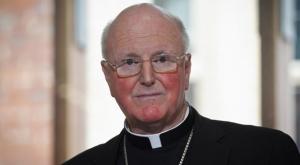A Wheaton Professor, Larycia Alaine Hawkins has been suspended for posting on Facebook that Christians and Muslims, “…as Pope Francis stated last week, worship the same God.” This has been picked up by the Washington Post and is already being analyzed here at Patheos.
This isn’t a new question, and both articles above note nuanced responses by Christian theologians. The latter of these by Baptist Theologian Timothy George represents a pretty standard evangelical answer. “Is the Father of Jesus the God of Muhammad? The answer is surely Yes and No,” he wrote. He continued: “Yes, in the sense that the Father of Jesus is the only God there is. … Christians and Muslims can together affirm many important truths about this great God—his oneness, eternity, power, majesty. … But the answer is also No, for Muslim theology rejects the divinity of Christ and the personhood of the Holy Spirit—both essential components of the Christian understanding of God. … Apart from the Incarnation and the Trinity, it is possible to know that God is, but not who God is.”
This theological stance seems straight forward. Christians have a uniquely real understanding of God as Trinity, something revealed through life, death, and resurrection of Jesus Christ. Since this unique Christian understanding depends on accepting the revelation of Jesus as the Christ then it would seem impossible for non-Christians to understand God. A non-Christian can know “that God is, but not who God is.”
But do you need to know who God is to worship God? Miroslav Volf, to whose views Professor Hawkins referred in her Facebook post, believes that orthodox Christians and Muslims do speak about and worship the same God. Only “the description of God is partly different.”
But let’s take away the binary of knowing and not knowing. Perhaps the difference is partly knowing and fully knowing.
Even then there is a problem: For with the assertion that Christians and Muslims do not worship the same God one surely also asserts that Christians and Jews do not worship the same God. Jews do not accept a Trinitarian view of God, and they reject the claim that Jesus was the Son of God or the Messiah whose coming was predicted by the prophets. So if a Trinitarian understanding of God is necessary to worship the same God as Christians then it appears that Jews also don’t worship the same God.
And this of course is something evangelicals, being in possession of the Biblical witness, cannot possibly assert. There is no indication in the witness of the New Testament that Jesus or his apostles believed that the Jews didn’t worship God. Quite to the contrary – the God of Abraham, Isaac, and Jacob is the God and Father of the Lord Jesus Christ in all Christian teaching. Early Christians worshiped alongside Jews in their synagogues.
What this tells us is common sense. If worship depends on a full understanding of a transcendent God by finite human minds then any claim to worship God is bogus. And if you make the test for worship a particular set of beliefs you are setting yourself up to exclude people who the Bible tells you clearly worship the same God. Worse, you are probably cutting off from the possibility of worship children, the intellectually challenged (whose incapacity for abstract thought precludes a grasp of Trinitarian doctrine) and large numbers of other faithful followers of Christ who don’t quite share and cannot ever share your doctrinal understanding.
But Wheaton is trapped, like almost all contemporary American Evangelicals, in a modernist paradigm in which a human relationship with God, or indeed reality at any level, depends upon belief. In fact the Bible teaches, indeed Jesus teaches that a relationship with God depends on faith: This is faith that Jesus attributes to many persons including both Jews and Gentiles who have no understanding of or belief in the orthodox teachings of the church about the Trinity. These persons are responding to a God who has never “has not left himself without a witness in doing good—giving you rains from heaven and fruitful seasons, and filling you with food and your hearts with joy.” (Acts 14:16) And one might add healing the sick, feeding the hungry, clothing the naked, and giving comfort to the prisoner as Jesus did.
Wheaton needs to ask – Is the witness of God to the nations to which Paul refers inadequate? Has God failed to make God’s essential nature known for all these millennia to all these peoples. Paul says, to go back to the Bible in which one supposes the folks at Wheaton believe, “For what can be known about God is plain to them, because God has shown it to them. Ever since the creation of the world his eternal power and divine nature, invisible though they are, have been understood and seen through the things he has made.” (Romans 1:19-20) For Paul this means that humans have no excuse for their unrighteous behavior. It also means that they have the possibility of responding to God in faith, as Paul expects of the people of Lystra and Derbe.
To require a grasp of evangelical doctrine as the litmus test for true worship of God is to set a standard too high for most Christians to meet, much less Jews (or Muslims.) But I will venture that what is at stake here is not doctrinal consistency, but a long evangelical suspicion of academic freedom. Which is understandable. If you think that true worship depends on true beliefs, and that salvation depends on the kind of true worship that alone places one in right relationship with God, then a commitment to academic freedom is a dangerous heresy.
In the end Wheaton can require that its professors “engage in and speak about public issues in ways that faithfully represent the College’s evangelical Statement of Faith.” What they are really saying is that putting on intellectual blinders is the only way a Christian can follow the straight and narrow.











